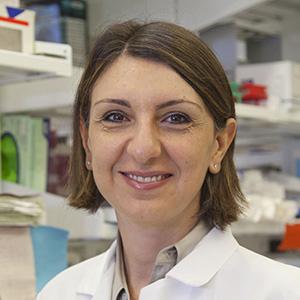GNAS as a new therapeutic target for MDS

Eirini Papapetrou
PhD, MDIcahn School of Medicine at Mount Sinai
Project Term: October 1, 2022 - September 30, 2025
Myelodysplastic syndrome (MDS) is a blood disease with poor prognosis and frequent progression to acute myeloid leukemia (AML). There are currently no effective treatments. This proposal is based on a recent discovery by my group and proposes to investigate a protein called G⍺s (alpha subunit of the stimulatory G protein), as a novel therapeutic target for MDS. If successful, this work can lead to novel therapies that can transform the treatment of MDS, AML and possibly other cancers.
The proposed project addresses a highly unmet clinical need, which is the current lack of effective treatments for patients with Myelodysplastic syndrome (MDS), a type of blood cancer.
There are currently limited therapeutic options for MDS, which is largely due to the fact that, until about a decade ago, we understood little about the genes that are mutated in MDS patients and cause the disease. This has changed with genetic testing in recent years, but this information has not yet translated to new therapies or cures, because there are still gaps in our understanding of how these mutated genes cause MDS.
My group has dedicated a decade of research to the development of novel models of MDS using cells from the bone marrow or blood of patients. With these we recently discovered a critical protein, involved in cell communication, that, as our data suggest, plays a very important role in a large fraction of MDS patients who have mutations in splicing factor genes. We already have substantial evidence that this protein, called the “alpha subunit of the G stimulatory protein” or G⍺s, is critical to MDS development from an early disease stage. (These results have been peer-reviewed and published in a prestigious journal and are the subject of a patent application that has been filed by Mount Sinai.) This discovery thus provides an exciting and novel therapeutic avenue with the potential to improve the quality of life of MDS patients or even cure the disease.
In the proposed work our goal is to collect additional evidence for the therapeutic value of targeting G⍺s in MDS patients with splicing mutations. To this end, we are conducting research using preclinical models that we have developed, as well as bone marrow and blood from patients with MDS. We will test the effects of various methods to inhibit this protein and chemical compounds that can be further developed into drugs in these cells to determine how they respond to this treatment.
We are collaborating with clinicians at Mount Sinai, a major site of care of MDS patients, to translate these findings to a clinical trial. We are committed to see our work all the way to its translation to the clinic to improve patient outcomes.